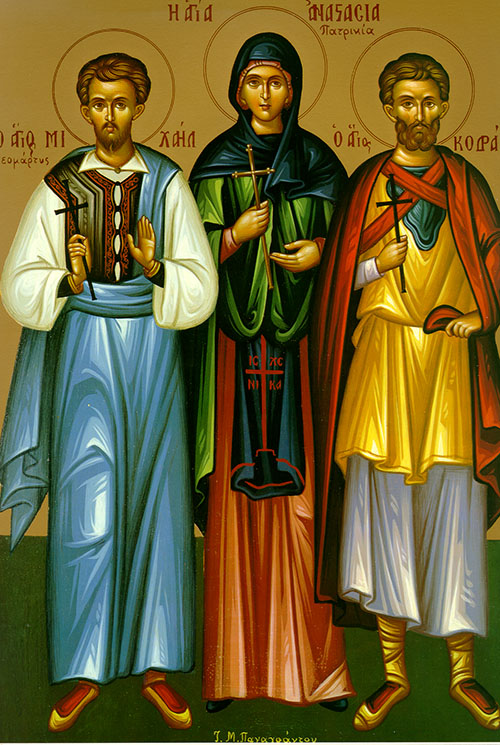

During the time of the persecutions of Christians, many of the faithful fled to the mountains and into the caves. So did the mother of Quadratus(or Codratus). She gave birth to him in the forest, but died shortly thereafter. By the Providence of God the infant Quadratus remained alive and was nourished in a miraculous manner: a cloud appeared over him, dropping sweet dew into his mouth. The childhood and youth of the saint was spent in the wilderness. When he was a young man, he chanced upon some Christians who enlightened him with the light of the true faith. Quadratus studied medicine and healed the sick with natural cures and more often, with the spiritual power of prayer, which had been with him since childhood. When a new persecution arose under Decius, Quadratis was brought to trial and cast into prison. Five companions joined him and confessed in the name of Christ. They were Cyprian, Dionysius, Anectus, Paul, and Cresens. They were tortured, but all stood firmly for the Faith. The martyrs were ordered to be thrown to the wild beasts to be torn apart. But the beasts would not touch them. Then the saints were tied behind chariots and dragged through the streets of the city. Finally, they were beheaded by sword. A spring of water gushed out of the ground at that spot, which is called “Quadratus” even today and is a reminder of the heroic deaths of these six holy innocents of Christ. They honorably suffered for the truth in the year 250, in Corinth.
O Lord our God, your holy martyrs have deserved the crown of immortality on account of their good fight. Armed with your strength, they have vanquished their persecutors and crushed Satan’s dreadful might. Through their supplications, O Christ our God, save our souls.
By enduring violence you slew the proud enemy as you and your companions felt the pains of the sword. We celebrate your memory, holy Codratus, and we sing: All you unconquerable martyrs, remember us to the Lord.
In the seventh month, on the seventeenth day of the month, the ark came to rest on the mountains of Ararat. The waters continued to diminish until the tenth month, and on the first day of the tenth month the tops of the mountains appeared.
At the end of forty days, Noah opened the hatch of the ark that he had made, and he released a raven. It flew back and forth until the waters dried off from the earth. Then he released a dove, to see if the waters had lessened on the earth. But the dove could find no place to perch, and it returned to him in the ark, for there was water over all the earth. Putting out his hand, he caught the dove and drew it back to him inside the ark. He waited yet seven days more and again released the dove from the ark. In the evening the dove came back to him, and there in its bill was a plucked-off olive leaf! So Noah knew that the waters had diminished on the earth. He waited yet another seven days and then released the dove; but this time it did not come back.
In the six hundred and first year, in the first month, on the first day of the month, the water began to dry up on the earth. Noah then removed the covering of the ark and saw that the surface of the ground had dried. In the second month, on the twenty-seventh day of the month, the earth was dry.
Then God said to Noah: Go out of the ark, together with your wife and your sons and your sons’ wives. Bring out with you every living thing that is with you– all creatures, be they birds or animals or crawling things on the earth– and let them abound on the earth, and be fertile and multiply on it. So Noah came out, together with his sons and his wife and his sons’ wives; and all the animals, all the birds, and all the crawling creatures that crawl on the earth went out of the ark by families.
Then Noah built an altar to the Lord, and choosing every clean animal and every clean bird, he offered burnt offerings on the altar. When the Lord smelled the sweet odor, the Lord said to himself: Never again will I curse the ground because of the human beings, since the desires of the human heart are evil from youth; nor will I ever again strike down every living being, as I have done.
The mouth of the just yields wisdom, but the perverse tongue will be cut off.
The lips of the just know favor, but the mouth of the wicked, perversion.
False scales are an abomination to the Lord, but an honest weight, his delight.
When pride comes, disgrace comes; but with the humble is wisdom.
The honesty of the upright guides them; the faithless are ruined by their duplicity.
Wealth is useless on a day of wrath, but justice saves from death.
The justice of the honest makes their way straight, but by their wickedness the wicked will fall.
The justice of the upright saves them, but the faithless are caught in their own intrigue.
When a person dies, hope is destroyed; expectation pinned on wealth is destroyed.
The just are rescued from a tight spot, but the wicked fall into it instead.
By a word the impious ruin their neighbors, but through their knowledge the just are rescued.
When the just prosper, the city rejoices; when the wicked perish, there is jubilation.
Through the blessings of the upright the city is exalted, but through the mouth of the wicked it is overthrown.
Whoever reviles a neighbor lacks sense, but the intelligent keep silent.
Icon courtesy of Jack Figel, Eastern Christian Publications – ecpubs.com
Thursday, March 9 –